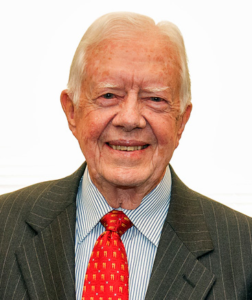“My commitment to Israel’s security and prosperity is unwavering, and I believe that peace in the Middle East is essential for the future of all its people”. ~Former U.S, President Jimmy Carter
By Barrett Holman Leak


SAN DIEGO — L’Chaim! Life is deeply, reverently, exuberantly valued in Judaism and Jewish culture. Living a long life is considered a great blessing. As former U.S. President Jimmy Carter celebrates his 100th birthday today, we have the opportunity to reflect on the remarkable life and enduring legacy of a man who has particularly impacted Israel and the Jewish community.
Born James Earl Carter Jr. in Plains, Georgia, in 1924, Carter’s journey from a small-town peanut farmer to the 39th President of the United States is a testament to his dedication, resilience, and unwavering commitment to service.
A Lifelong Commitment to Habitat for Humanity
My personal connection to Jimmy Carter began with his involvement in Habitat for Humanity. In 1984, Carter and his wife, Rosalynn, joined the organization, which builds and renovates homes for those in need. Their dedication to Habitat for Humanity has inspired countless volunteers, including myself. As a young girl, I was moved by Carter’s hands-on approach and his belief in the power of community service. This inspiration led me to volunteer for the past several decades with Habitat for Humanity, helping to build and upgrade homes for families in need. Participating in lifting a house off its broken foundation to put in a new one, installing faucets and hammering nails into shelving and helping install flooring makes you tired and achy at the end of a day but energized by the joy of seeing impoverished people who didn’t have a home receive one.
Carter’s commitment to Habitat for Humanity is legendary. Even into his 90s, he could be found on construction sites, hammer in hand, working alongside volunteers. According to CBS News, his efforts have helped build over 4,300 homes in 14 countries, demonstrating his unwavering dedication to improving lives through affordable housing.
Later, Carter would further and more profoundly impress me and the world with the way in which he lived out his values of service and peace. But for those who do not know much about Jimmy Carter, I will take the occasion of his centennial to share about this formidable yet humble human being.
Early Life and Political Career
Jimmy Carter was born to James Earl Carter Sr., a successful local businessman, and Lillian Gordy Carter, a registered nurse known for her humanitarian work. Carter’s upbringing in the rural South instilled in him a strong work ethic and a deep sense of community. He attended the U.S. Naval Academy, graduating in 1946, and served in the Navy until 1953, when he returned to Georgia to manage the family peanut business.
Carter’s political career began in the Georgia State Senate, where he served from 1963 to 1967. He then became the 76th Governor of Georgia from 1971 to 1975, focusing on education, civil rights, and government reform. His success as governor paved the way for his presidential campaign, and in 1976, he was elected President of the United States.
Presidency and Beyond
Carter’s presidency (1977-1981) overall was marked by significant achievements and challenges. Domestically, he faced economic difficulties, including inflation and an energy crisis. However, his administration is best remembered for its foreign policy successes, particularly the Camp David Accords, which brokered peace between Israel and Egypt. This landmark agreement and his decades of service in resolving international conflicts and other humanitarian efforts earned Carter the Nobel Peace Prize in 2002.
After leaving office, Carter continued to champion human rights and global peace through the Carter Center, which he founded in 1982 with his wife Rosalynn. It has made significant contributions to global health, democracy, and human rights.
Eradication of Guinea Worm Disease: The Carter Center has led a coalition that reduced the incidence of Guinea worm disease by 99.99%, making it likely to be the second human disease, after smallpox, to be eradicated.
Election Monitoring: The Center has observed 125 elections in 40 countries, helping to establish and strengthen democracies around the world.
Conflict Resolution: The Carter Center has played a crucial role in mediating conflicts and furthering peace in regions such as Ethiopia, Eritrea, Liberia, Sudan, South Sudan, Uganda, the Korean Peninsula, Haiti, Bosnia and Herzegovina, and the Middle East.
Health Initiatives: The Center has pioneered new public health approaches to prevent or control devastating neglected diseases in Africa and Latin America, including efforts to eliminate trachoma and river blindness.
Mental Health Advocacy: The Carter Center has advanced efforts to improve mental health care and reduce the stigma against people with mental illnesses through initiatives like the Rosalynn Carter Fellowships for Mental Health Journalism.
Human Rights Advocacy: The Center has strengthened international standards for human rights and amplified the voices of individuals defending those rights in their communities worldwide
Carter’s Relationship with Israel and the Jewish Community
In one arena, there is some considerable controversy, and that is about Jimmy Carter’s relationship with the American Jewish community and Israel. There are those who felt he was antisemitic. But this is the same man who did what was deemed to be impossible: he brokered a peace treaty between Israel and its arch enemy, Egypt.
As U.S. President, Carter played a pivotal role in the Camp David Accords, which established a framework for peace between Israel and Egypt. This achievement was a significant step towards stability in the Middle East and showcased Carter’s commitment to peace.
Carter’s views on Israel in later years have sometimes been controversial. His 2006 book, Palestine: Peace Not Apartheid, criticized Israeli policies in the West Bank and Gaza, leading to backlash from some in the Jewish community. Critics argue that Carter’s use of the term “apartheid” to describe Israeli policies in the West Bank and Gaza is inflammatory and unsubstantiated. They contend that this comparison is not only misleading but also harmful, as it oversimplifies the complex Israeli-Palestinian conflict and unfairly stigmatizes Israel. This same argument is being raised in the Jewish community regarding charges of “apartheid” and “genocide” being leveled at Israel now in the Israel-Hamas War.
Additionally, some have accused Carter of perpetuating negative stereotypes about Israel and its supporters, suggesting that his portrayal of the situation lacks balance and fails to acknowledge the security challenges faced by Israel.
In response to these criticisms, Carter has maintained that his goal was to initiate an essential discussion about achieving peace in the region.
Consider also that Carter has consistently expressed his respect for the Jewish people and his desire for a peaceful resolution to the Israeli-Arab conflict. In a letter to the Jewish community, he wrote, “We must recognize Israel’s achievements under difficult circumstances, even as we strive in a positive way to help Israel continue to improve its relations with its Arab populations, but we must not permit criticisms for improvement to stigmatize Israel”.
Since last October 7, 2023, Arabs in the Middle East and particularly in The United States of America, have demanded in various ways that American colleges and universities as well as businesses divest their funds from Israel and tried to make businesses stop stocking Israeli products. Carter made it a federal issue and blocked the exact kind of boycott demands in the 1970s by enacting the Israel Anti-Boycott Act of 1977. It makes me wonder why wasn’t that done by U.S. President Joe Biden – an updated Israel Anti-Boycott Act of 2024? Would that have derailed and blocked the uncivil antisemitic pro-Palestinian city council demonstrations and campus protests that were launched under the guise of seeking boycotts and divestment from Israel?
Carter’s friendships with American Jews and Israelis have also been notable. To this day, he has maintained close relationships with several Jewish leaders and was instrumental in the establishment of the United States Holocaust Memorial Museum in Washington, D.C. His efforts to support Soviet Jewish emigration and his advocacy for Iranian Jews fleeing the revolution – clearly opening U.S. borders to allow their mass immigration to the United States of America further highlight his commitment to the Jewish community.
You can read a more thorough article on Jimmy Carter, Israel and Jews HERE
He is not a perfect man, but, where would Israel and the American Jewish community be today without the service and effort of Jimmy Carter and his work with Yitzak Rabin, Menachem Begin and Anwar Sadat? Where would all the poor and houseless people be who benefitted from his Habitat for Humanity advocacy and service? Has Jimmy Carter been a living example of tikkun olam or not?
I think we are all challenged to ask what we will do to improve this broken world over the course of 100 years. Meanwhile, I think it is only right to celebrate. As we honor Jimmy Carter on his 100th birthday, we celebrate a life dedicated to service, peace, and the betterment of humanity. His legacy continues to inspire and remind us of the profound impact one individual has had on Israelis, American Jews and the Jewish Diaspora as well as how much one life can powerfully impact the world.
*
Barrett Holman Leak is an author, educator, and community organizer.